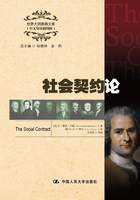
第一章 第一卷的主题
“人生来是自由的,却无处不在枷锁之中”,这为后来革命者和思想家们频繁引用的一句话,是卢梭思想的高度浓缩,是贯穿他所有作品的一根红线。要真正明白这句话,就不能不认真研读卢梭的其他几本在思想史上同样举足轻重的著作。《论人类不平等的起源》描述了自然状态是如何美好、平等与自由,人们又是如何进入社会这个枷锁;《论科学与艺术》告诉人们滥用的科学是如何弱化了人的行为能力,刻意雕琢的艺术如何使人失去了淳朴;《爱弥尔》告诉人们错位的教育将如何扭曲人性,崇尚自然和天性的教育将如何使成长受益。
卢梭想要表达,在人无法抗拒地进入社会状态后,必然会失去天然自由与平等,戴上随着社会进步带来的重重枷锁。卢梭笔下的自然状态也许并非真实存在的历史阶段,但它是卢梭对社会现状和文明人的属性层层剥析后得出的一个逻辑结论,也是本书论证的一个逻辑前提。卢梭在此明确指出,他不是在探讨如何能够解除人们身上的政治枷锁,重新恢复他们的天然自由,他要论证的是,如何使他们身上的枷锁合法化,如何取得社会自由。同时,强力等任何来自自然的力量都不能使政治权威合法化,只有“建立在特殊约定基础上”的政治秩序才是合法的。
1. SUBJECT OF THE FIRST BOOK
MAN is born free ; and everywhere he is in chains. One thinks himself the master of others, and still remains a greater slave than they. How did this change come about? I do not know. What can make it legitimate? That question I think I can answer.
; and everywhere he is in chains. One thinks himself the master of others, and still remains a greater slave than they. How did this change come about? I do not know. What can make it legitimate? That question I think I can answer.
If I took into account only force, and the effects derived from it, I should say: “As long as a people is compelled to obey, and obeys, it does well; as soon as it can shake off the yoke, and shakes it off, it does still better; for, regaining its liberty by the same right as took it away, either it is justified in resuming it, or there was no justification for those who took it away.” But the social order is a sacred right which is the basis of all other rights. Nevertheless, this right does not come from nature, and must therefore be founded on conventions. Before coming to that, I have to prove what I have just asserted.